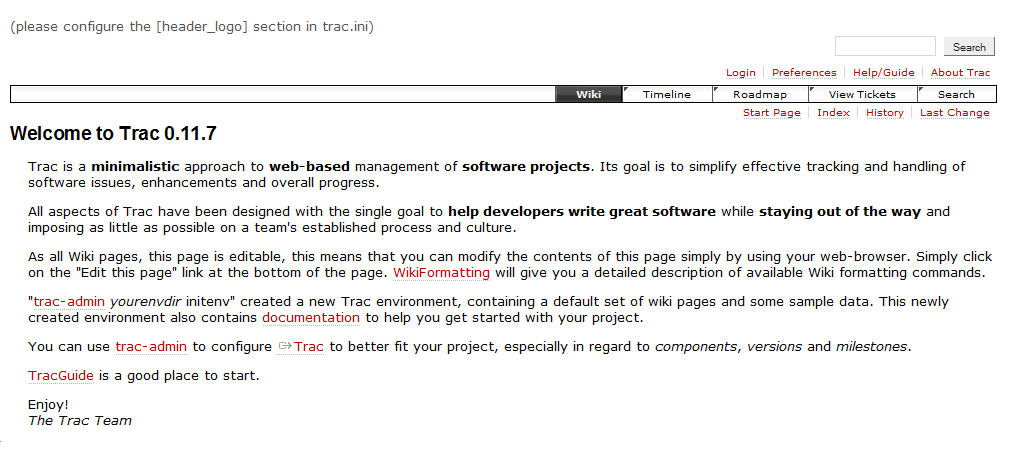Trac
 | |
| Developer(s) | Edgewall Software |
|---|---|
| Initial release | October 1, 2006 |
| Stable release | 1.4.4 (August 11, 2023) [±] |
| Preview release | none [±] |
| Written in | Python |
| Operating system | Cross-platform |
| Type |
Project management software Bug tracking software |
| License(s) | Modified BSD license |
| Website | trac.edgewall.org |
Trac is open-source, web-based project management and bug-tracking software. The program is inspired by CVSTrac and was originally named svntrac due to its ability to interface with Subversion.[1]
Product history
Trac was available under the GNU General Public License until mid-2005; since version 0.9, it has been released under a modified BSD license.[2]
Features
Trac allows users to hyperlink information between a bug tracking database, revision control, and wiki content, allowing for seamless references between bugs, tasks, files, and changesets. It also serves as a web interface to the following revision control systems: Subversion, Git, Mercurial, Bazaar, Perforce and Darcs. Prior to version 0.11 the web front end presentation of Trac was handled by the ClearSilver template system. Starting with 0.11 an in-house template system called Genshi is used, although compatibility with ClearSilver-based plugins will remain until version 0.13dev.[3]
Other features include:
- Project management (roadmap, milestones, etc.)
- Ticket system (bug tracking, tasks, etc.)
- Fine-grained permissions (since 0.11)
- Timeline of all recent activity
- Wiki (syntax similar to MoinMoin)
- Customized reporting
- Version control system web interface
- RSS feeds
- E-mail notifications
- Multiple project support (planned for post-1.0 versions)
- Environment extensibility (via Python plugins)
- iCalendar export[4]
- Multiple repository support per environment (since 0.12)
- Interface localizations (since 0.12)
- Roadmap for better managing projects and upcoming milestones
Hardware/software requirements
Requirements for this software to run properly include:
1. a Python software package, version >= 2.4 and < 3.0
2. the setuptools Python enhancement suite
3. Edgewall's Genshi Python toolkit for generation of web content
4. a SQLite, PostgreSQL, or MySQL database installation with the corresponding Python bindings
Depending on which database type you use, there are additional dependencies that should be observed. You can find out more about those dependencies and the optional dependencies for add-ons like Subversion here.
Videos, screenshots, and other media
Click a screenshot to see a larger version. Alternatively, right-click and choose to open it in a separate tab/window.
Entities using Trac
Examples of entities that use Trac include:
Australian National University Data Mining Grou, Carinthia University of Applied Sciences, NASA Langley Research Center, National Taiwan University Department of Physics, Nokia, Open Knowledge Foundation, PhysioSonics, Rensselaer Polytechnic Institute, Sandia National Laboratories, SourceForge, University of Oxford, University of Wuppertal, Wordpress
A full directory of Trac users can be found at the Trac website.
Further reading
- "Trac Books - The Trac Project". Edgewall Software. http://trac.edgewall.org/wiki/TracBooks.
- "Trac and Subversion". Edgewall Software. http://trac.edgewall.org/wiki/TracSubversion.
External links
References
- ↑ "Trac and Subversion". Edgewall Software. http://trac.edgewall.org/wiki/TracSubversion. Retrieved 9 March 2012.
- ↑ "TracLicense - The Trac Project". Edgewall Software. http://trac.edgewall.org/wiki/TracLicense. Retrieved 9 March 2012.
- ↑ "ClearSilver - The Trac Project". Edgewall Software. http://trac.edgewall.org/wiki/ClearSilver. Retrieved 09 March 2012.
- ↑ "The Trac Roadmap". Edgewall Software. http://trac.edgewall.org/wiki/TracRoadmap. Retrieved 9 March 2012.










